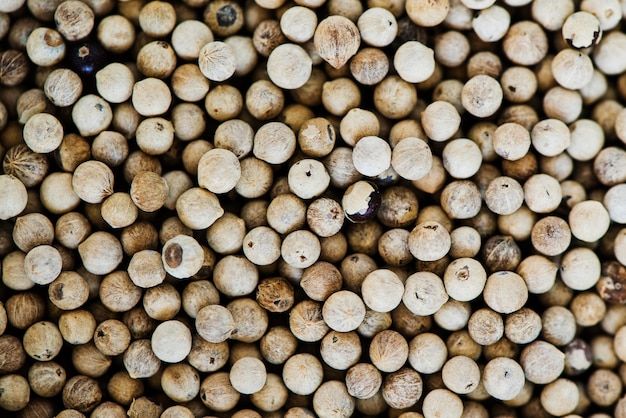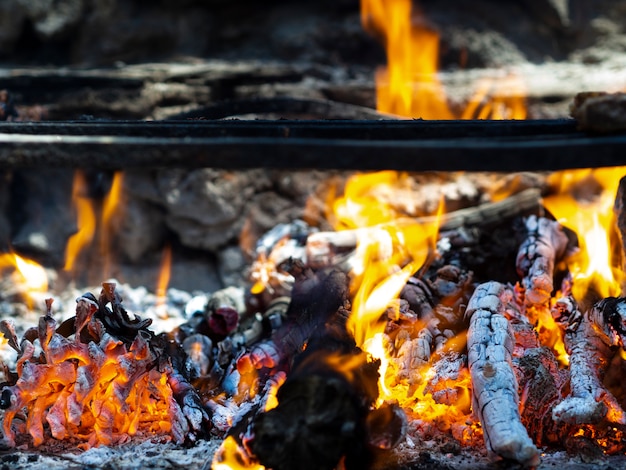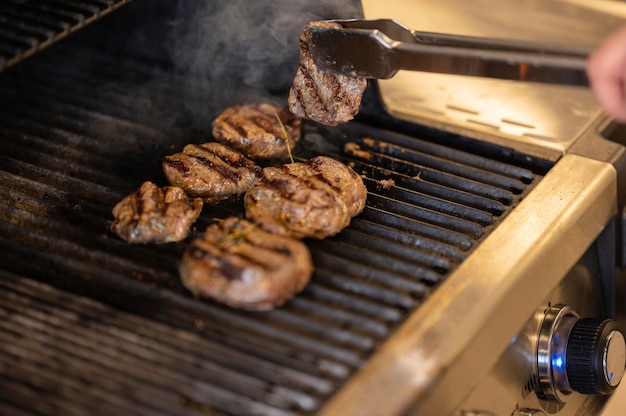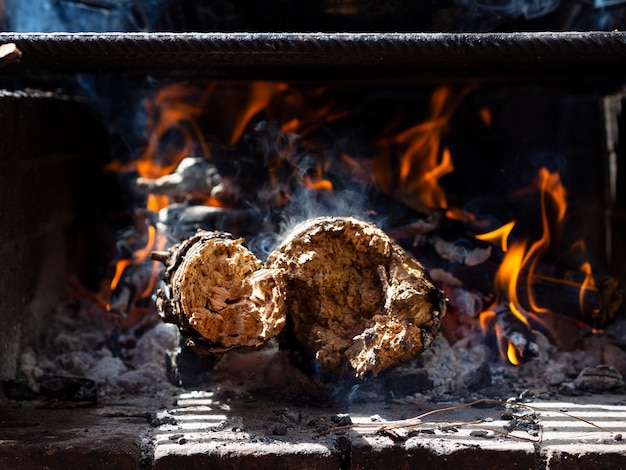Can you use a pellet grill in the rain?
One of the questions that often arises when it comes to pellet grills is whether or not they can be used in the rain. For many BBQ enthusiasts, cooking outdoors is a year-round affair, and knowing if their grill can withstand wet weather conditions is crucial. In this article, we will explore the topic of using a pellet grill in the rain, providing both a concise answer and a more detailed explanation.
The short answer
Yes, you can use a pellet grill in the rain, but precautions need to be taken to ensure safety and efficiency. Pellet grills generally have electrical components that need protection from moisture to prevent damage or potential hazards. However, with the right precautions, you can still enjoy the convenience and delicious results of pellet grilling even on rainy days.
Protecting your pellet grill
To use a pellet grill in the rain, it is important to take necessary measures to protect it from water damage. Here are some tips:
- Place your grill in a covered area: If possible, position your pellet grill under a roof, awning, or any other protective structure that shields it from direct rainfall. This will help prevent water from seeping into the grill’s electrical components.
- Invest in a grill cover: A high-quality grill cover specifically designed for your pellet grill can offer an extra layer of protection against rain and moisture. Make sure to choose a cover that is durable, waterproof, and fits your grill properly.
- Use a waterproof extension cord: If you need to plug in your pellet grill, make sure to use a waterproof extension cord to avoid any electrical hazards. Keep the cord elevated off the ground and protected from pooling water.
- Position the pellet hopper away from rain: Most pellet grills have a hopper where the wood pellets are stored. Ensure that the hopper is not directly exposed to rain as moisture can cause pellets to swell and potentially jam the auger.
By following these precautions, you can minimize the risk of damage to your pellet grill and ensure a safe and enjoyable cooking experience, even when it’s raining outside.
A note on pellet grill performance in wet conditions
While it is possible to use a pellet grill in the rain, it is important to note that weather conditions can affect its performance. Rainy and humid weather can impact pellet combustion and potentially result in lower temperatures or increased pellet consumption.
Due to the presence of moisture, pellets might not burn as efficiently, which can affect heat levels and cooking times. It is advisable to keep an eye on temperature settings and make adjustments if needed during wet weather. Additionally, using a larger pellet grill with higher wattage can help maintain consistent heat even in adverse weather conditions.
“Using a larger pellet grill with higher wattage can help maintain consistent heat even in adverse weather conditions.”
It’s also worth noting that rain can create additional challenges for outdoor cooking, such as wind and uneven heat distribution. However, with the right techniques and adjustments, you can still achieve great results with your pellet grill, even on rainy days.
Can a Pellet Grill Be Used Indoors?
Grilling is a beloved pastime for many people in the UK, but the unpredictable weather can often put a damper on outdoor cooking plans. This has led many grill enthusiasts to wonder if they can use their pellet grills indoors. While it may be tempting to bring your grill indoors, there are several factors to consider before doing so.
1. Ventilation and Safety
Pellet grills generate smoke when cooking, which can quickly fill an indoor space and create a potential fire hazard. Additionally, the combustion process requires proper ventilation to prevent the build-up of carbon monoxide, a colorless and odorless gas that can be deadly.
2. Size and Space
Pellet grills tend to be larger and bulkier than other types of grills, making them less practical for indoor use. They require ample space around them for proper air circulation and safe operation.
3. Smoke Extraction
Even with proper ventilation, it can be challenging to extract the smoke generated by a pellet grill indoors. The lingering smell can permeate furniture, curtains, and walls, leaving an unwanted odor in your home.
4. Alternatives for Indoor Grilling
If you’re determined to grill indoors, there are alternatives available that are specifically designed for indoor use. Electric tabletop grills, stovetop griddles, and contact grills are all excellent options for satisfying your grilling cravings without the risks associated with using a pellet grill indoors.
“While it may be tempting to bring your grill indoors, there are several factors to consider before doing so.”
In conclusion, while a pellet grill offers incredible versatility and flavor outdoors, it is not recommended for indoor use. The risks associated with improper ventilation, space limitations, and smoke extraction make it a better option to enjoy your pellet grill in an outdoor setting.
How Does Altitude Affect Pellet Grills?
Altitude can have a significant impact on the performance of pellet grills. The changes in air pressure and temperature at higher altitudes can affect the overall operation and cooking capabilities of these grills, requiring some adjustments for optimal results.
1. Combustion Efficiency
At higher altitudes, the thinner air can affect the combustion efficiency of pellet grills. The lower oxygen levels can cause incomplete combustion, leading to reduced heat output and potentially affecting the flavor of the food being cooked. To compensate for this, pellet grill users may need to increase the airflow or adjust the temperature settings accordingly.
2. Temperature Control
The changes in air pressure at higher altitudes can impact temperature control on pellet grills. Due to the reduced atmospheric pressure, water boils at a lower temperature, resulting in lower boiling points. This can cause variations in cooking times and temperature accuracy. Users may need to make adjustments to their cooking times and monitor the internal temperature more closely to achieve desired results.
3. Pellet Consumption
Altitude can also affect the rate at which pellets are consumed in a pellet grill. The lower oxygen levels at higher altitudes can cause the pellets to burn more slowly, making them last longer than at sea level. It’s important to take this into consideration when planning for fuel consumption and be aware that cooking times may differ compared to lower elevations.
Altitude can have a significant impact on the performance of pellet grills, but with some adjustments and careful monitoring, users can still achieve great results no matter the altitude.
To help you understand the effect of altitude on pellet grills, here’s a table summarizing the main considerations:
| Aspect | Impact at Higher Altitudes |
|---|---|
| Combustion Efficiency | Incomplete combustion due to lower oxygen levels |
| Temperature Control | Variations in cooking times and temperature accuracy |
| Pellet Consumption | Pellets burn more slowly, lasting longer |
When using pellet grills at higher altitudes, it is advisable to consult the manufacturer’s guidelines and make any necessary adjustments to ensure optimal cooking performance. By understanding and accounting for the effects of altitude, you can continue to enjoy delicious meals from your pellet grill regardless of your location.
Do you need an outlet for a pellet grill?
Do you own a pellet grill or are considering purchasing one? One important factor to consider is whether you will need an electrical outlet to power it. Let’s delve into this topic and explore whether an outlet is necessary for your pellet grill.
What is a pellet grill?
A pellet grill is a versatile outdoor cooking device that combines the features of a smoker, grill, and oven. It uses wood pellets as its fuel source, which are fed into a hopper and automatically ignited to produce heat and smoke. Pellet grills offer precise temperature control and can be used to smoke, grill, bake, roast, and more.
Power requirements for pellet grills
Most pellet grills require electricity to operate certain components, such as the digital controller, auger motor, and combustion fan. The electric components ensure that the pellets are fed into the firepot consistently, maintain the desired temperature, and circulate smoke throughout the cooking chamber. However, the power consumption of pellet grills is relatively low, typically ranging from 50 to 300 watts.
Options for powering your pellet grill
If you have an electrical outlet near your outdoor cooking area, you can simply plug in your pellet grill and start cooking. However, if you don’t have an outlet nearby, there are a few alternative options:
- Extension cord: You can use a heavy-duty extension cord to connect your pellet grill to an existing outdoor outlet. Make sure to choose an extension cord with the appropriate gauge to handle the wattage of your grill.
- Dedicated circuit: If you plan on using your pellet grill frequently, it may be worth installing a dedicated electrical circuit near your cooking area. This will ensure a reliable power source and eliminate the need for extension cords.
- Portable power station: Another option is to use a portable power station or generator to provide electricity for your pellet grill. These devices can be handy for outdoor cooking or camping trips where access to electrical outlets may be limited.
Do Pellet Grills Produce a Lot of Smoke?
Pellet grills have gained popularity in recent years as an alternative to traditional charcoal or gas grills. They offer convenience, precise temperature control, and the ability to infuse smoky flavors into your food. However, one question that often arises is whether pellet grills produce a lot of smoke.
Understanding How Pellet Grills Work
Pellet grills use wood pellets as a fuel source. These pellets are made from compressed sawdust and are available in various flavors such as hickory, mesquite, or applewood. The pellets are fed into a hopper and then into a firepot by an electric auger system. An igniter rod ignites the pellets, creating heat and smoke.
Smoke Production
In comparison to charcoal or wood-fired grills, pellet grills tend to produce less visible smoke. This is because the combustion process is highly efficient, resulting in minimal particulate matter being released into the air. However, it’s important to note that while pellet grills may not produce billows of smoke like traditional grills, they still generate enough smoke to infuse incredible flavors into your food.
The Smoke Setting
Most pellet grills have a “Smoke” setting that allows you to intensify the smoky flavor. This setting lowers the temperature and increases the amount of smoke produced by slowing down the pellet feed rate. It’s perfect for when you want to achieve that authentic smoked taste in your food.
Benefits of Minimal Smoke
The reduced smoke production of pellet grills offers several advantages. Firstly, it allows for a cleaner and more enjoyable cooking experience, free from strong smoke odors or eye irritation. Secondly, it makes pellet grills suitable for use in areas with restrictions on open flames or excessive smoke. Lastly, less smoke means that your food is less likely to be overpowered by the smoky flavor, allowing other seasonings and marinades to shine through.
In Conclusion
While pellet grills may not produce copious amounts of visible smoke, they still impart delicious smoky flavors into your food. Their efficient combustion process and the ability to control the smoke setting make them a popular choice among barbecue enthusiasts.
Can you leave a pellet grill on overnight?
One common question among grill enthusiasts is whether it is safe to leave a pellet grill on overnight. The answer depends on several factors, including the specific model of the grill, its safety features, and your personal preferences. While some pellet grills are designed to be used for long periods without constant supervision, it is always important to prioritize safety.
Safety considerations when leaving a pellet grill on overnight:
- Fire hazards: Leaving any grill unattended poses potential fire risks. While pellet grills are generally safer than traditional charcoal or gas grills, there is still a small chance of fire if left unsupervised. It is recommended to place your grill in a well-ventilated area away from flammable materials.
- Temperature control: Most pellet grills have built-in temperature control features, allowing you to set the desired cooking temperature. However, it is crucial to ensure that the grill maintains a stable temperature throughout the night to prevent accidents.
- Pellet supply: Pellet grills operate by feeding wood pellets into a fire pot to produce heat and smoke. If you plan on leaving the grill on overnight, make sure you have enough pellets in the hopper to last the duration of your cook. Running out of pellets could result in temperature fluctuations or even extinguishing the fire.
Tip: Before leaving your pellet grill unattended overnight, consider doing a test run during the day to assess its stability and performance.
Factors to consider before leaving a pellet grill on overnight:
- Grill model and brand: Different pellet grill brands and models have varying safety features and durability levels. It is vital to invest in a reputable brand that prioritizes safety and offers reliable products.
- Weather conditions: Extreme weather conditions, such as heavy rain or strong winds, can affect the performance of your pellet grill. Consider the forecast before deciding to leave your grill unattended overnight.
- Personal preference: Ultimately, the decision to leave a pellet grill on overnight comes down to personal preference and comfort level. If you are not comfortable leaving it unattended, it is best to monitor the cooking process.
Remember, safety should always be a top priority when using any grill. If you decide to leave your pellet grill on overnight, take necessary precautions and follow the manufacturer’s instructions to ensure a safe cooking experience.
Conclusion
While an electrical outlet is not always necessary for a pellet grill, it is recommended to have one nearby for convenience. The electric components of the grill require minimal power and can easily be accommodated with an extension cord or dedicated circuit. However, if you frequently cook outdoors or in remote locations, investing in a portable power solution may be beneficial.
Remember to always prioritize safety when connecting electrical devices. Follow the manufacturer’s instructions and consult a qualified electrician if needed.
With the right power setup, you’ll be able to unleash the full potential of your pellet grill and enjoy delicious outdoor cooking experiences!



